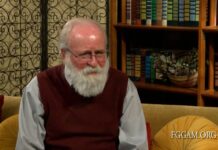
“Listen my children and you shall hear
Of the midnight ride of Paul Revere, On the 18th of April, in 75; Hardly a man is now alive Who remembers that famous day and year.He said to his friend, ‘If the British march By land or sea from the town to-night, Hang a lantern aloft in the belfry arch Of the North Church tower as a signal light,– 
One if by land, and two if by sea; … And yet, through the gloom and the light, … You know the rest. In the books you have read Chasing the redcoats down the lane, …
These lines are from the poem, Paul Revere’s Ride, written by Henry Wadsworth Longfellow, who was born FEBRUARY 27, 1807.
His grandfather had been a Revolutionary War general. His uncle, after whom he was named, Henry Wadsworth, a Naval hero who was killed fighting Muslim Barbary Pirates at the Battle of Tripoli, 1804.
Henry Wadsworth Longfellow was a Harvard professor and a popular American poet. He wrote such classics as:
The Song of Hiawatha;
The Courtship of Miles Standish, which sold 10,000 copies in London in a single day; and
Evangeline, in which he penned: “Man is unjust, but God is just; and finally justice triumphs.”
The house Longfellow lived in, 105 Brattle Street, Cambridge, Massachusetts, had previously been used as the Headquarters of General George Washington during the British’s Siege of Boston, July 1775-April 1776.
Longfellow’s poems were noted for imparting cultural and moral values, focusing on life being more than material pursuits.
In 1842, Longfellow expressed his public support for abolishing slavery by publishing a collection, Poems on Slavery, which was reprinted by The New England Anti-Slavery Association.
The most popular poet of his day, Longfellow was praised by his contemporaries: John Greenleaf Whittier, Oliver Wendell Holmes, Sr., James Russell Lowell and Ralph Waldo Emerson.
In 1884, he became the first non-British writer to be represented by a sculpted bust in London’s Poet’s Corner of Westminster Abbey.
In A Psalm of Life, 1838, Henry Wadsworth Longfellow wrote: “Life is real! Life is earnest! In the world’s broad field of battle, Trust no Future, howe’er pleasant! Lives of great men all remind us, -Footprints, that perhaps another, For God’s Glory Alone Ministries thanks Bill Federer and www.AmericanMinute.com
|




















